2020中考——初中英语常见动词短语和近义词辨析整理归纳
2020中考英语必会的50组重点词语(辨析)

2020中考英语必会的50组重点词语(辨析)英语短语词组在我们的英语学习当中非常重要,不同的词语组合有着很多种变化,下面是小编给大家带来的中考英语必会的50组重点词语,希望能够帮助到大家!2020中考英语必会的50组重点词语(辨析)1. after, in这两个介词都可以表示“……(时间)以后”的意思。
after 以过去为起点,表示过去一段时间之后,常用于过去时态的句子中。
如:She went after three days.她是三天以后走的。
in 以现在为起点,表将来一段时间以后,常用于将来时态的句子中。
如:She will go in three days.她三天以后要走。
2. how long, how often, how soonhow long指多长时间,主要用来对一段时间(如three days, four weeks 等)提问。
如:How long ago was it?这是多久前的事了?how often指每隔多久,主要用来对频率副词或状语(如once a week等)提问。
如:—How often does he come here? —Once a month.他(每隔)多久来一次?每月一次?how soon指再过多久,主要用来对表示将来的一段时间(in anhour, in two weeks 等)提问。
如:How soon can you come?你多快能赶来?3. few, a few, little, a little, several, somefew 和little的意思是否定的,表示“很少”或“几乎没有”;而a few和a little的意思是肯定的,表示“有一些,有一点儿”。
few 和 a few修饰可数名词;little 和 a little 修饰不可数名词。
several用于修饰可数名词,语意比a few和some更肯定,含有“好几个”的意思。
some可修饰可数名词,也可修饰不可数名词,从数量上说,它有时相当于a few 或 a little,有时指更多一些的数量。
2020中考初中英语常见(近义)词组归纳总结

中考初中英语常见(近义)词组归纳总结1.return-come/be back返回2.retum-give back归还3.at present-at this time, at the moment, now现在,如今4.difficult-hard,not easy困难的5. parents-one's father and mother父母6.also-too, as well as也7.perhaps-maybe或许,大概8.follow-come/go after跟随9.give sb.a hand-help sb.帮助某人10. certainly-of course, sure当然11. cross-go/walk across穿过12. photo-picture图画,相片13. agree-say "yes", have the same idea同意14. century-one hundred years世纪15. busy-not free, have no time忙的16. famous-very well - known著名的17. be filled with-be full of充满,装满18. fine~well身体好19. next to-close to, beside, near靠近,接近20. go off-rling铃响21. end-finish结束,完了22. around-about大约23. over-more than多于,超过24. finally-at last, in the end最后25. the same as-not different from与…相同的26. enter-go into进入27. happen-take place发生28. get up-get out of bed起床29. start-begin开始30. be ill/sick~not feel well生病31. take exercise-do/play sports做运动32. stay healthy-keep healthy/fit, be in good health保持健康33. stay up-not go to sleep because of doing something熬夜34. last name-family name姓氏35. sit down-take a seat就座,坐下36. again and again-over and over一遍又一遍37. alone-by oneself独自38.apologize-say sorry道歉,辩解39. present-gift礼物40. sure-certain确信的41. mostly-chiefly, almost all, generally主要地42. just now-a moment ago刚才43. several-a few, some几个,数个44. right away-at once, in a moment立即,马上45. in the slightest-at all根本46. must-have to不得不47. would like-want想要48. prefer-like.better than更喜欢49. semester-term学期50. offer-give提供给51. performer-actor or actress演员52. hardly-almost not几乎不53. reply-answer回答54. take after-look like长得像55. refuse-say no to…拒绝56. view-opinion, idea主意,观点57. take pride in-be proud of...以……为骄傲58. fail-not pass失败,不及格59. dress-put on clothes穿衣60. unleos-if not除非61. can-be able to能,会62. use up-run out of用尽,用完63. by accident-by chance偶然,无意中64. continue-go on, go further绁续65. take care of-care for, look after照顾66. fix up-repair, mend修理,修补67. on display-on show展览,陈列68. be angry with-be mad at对……生气69. what about-how about…怎么样70. do chores-do housework做家务71. be afraid of-be temfied of害怕72. lots of-a lot of, many, much许多73. cheer up-make someone happier使振奋,使高兴74. set up-establish, start建立,开创75. come up with-think of提出,想出76. clean up-make it clean and tidy扫除77. fetch-go and take sth. back取来78.be interested in-take an interest in对…感兴趣79. come from-be from来自80. not...any more-no more, no longer,not.…any longer不再81.enjoy oneself-have a good/great/nice/time, have fun过得愉快82.glad-happy,pleased高兴的83. sometimes-at times有时84. go to a mowe-go to see a film去看电影85. in a minute-very soon不久,很快86. for instance-for example例如87. as soon as possible-very soon尽快88. realize-understand and believe 察觉89. collect-get something together收集9 0. arrive-reach,get to到达91.a little-a bit -小点92. own-have拥有93. be good at-do well in擅长于94. take the subway-go by subway乘地铁95. walk-go on foot步行96. rush-move or go suddenly冲,跑97. anxious-worried,uneasy焦虑的98. leave for-go to出发去99. take a taxi-go by taxi乘出租车100. go in a ca-go by car秉小汽车101. ride a bike-go by bike骑自行车102. quite-very,rather很,非常,十分一、英语阅读理解专项练习试卷1.阅读理解1-5 of 90 days / All 9021°/13 °C Mostly cloudy 19 °/11 °PartialsunshineMore19 °/12 °Cloudsand sunMore20 °/12 °PartlysunnyMore22°/14 °Timesofcloudsand sunMoreMoreHistorical Weather Data (数据)Sunrise/suMoonrise/moonsetMoonrise: 9:03 PMMoonset: 9:01 AMDuration: 11:58 hrAstronomy (天文学)(1)What will the weather be like in threedays?A. Mostly cloudy.B. Partlysunny. C. Sunny andwindy. D. Cloudy and rainy.(2)What was the high temperature on Jun.29, 2018?A. 21℃.B. 13℃.C. 15℃.D. 26℃.(3)Which of the following days has thelowest temperature?A. JUN 29.B. JUN30. C. JUL1. D. JUL2.(4)When did the sun rise today?A. At 6:06 am.B. At 9:03pm. C. At 9:01 am.D. At 7:57 pm.(5)If you want to know about the weatherof next Friday, you can click "_____".A. More Historical Weather DataB. AstronomyC. Next 5D. More【答案】(1)B(2)A(3)B(4)A(5)B【解析】【分析】主要讲了未来5天的天气。
中考英语词汇辨析常考知识点是什么
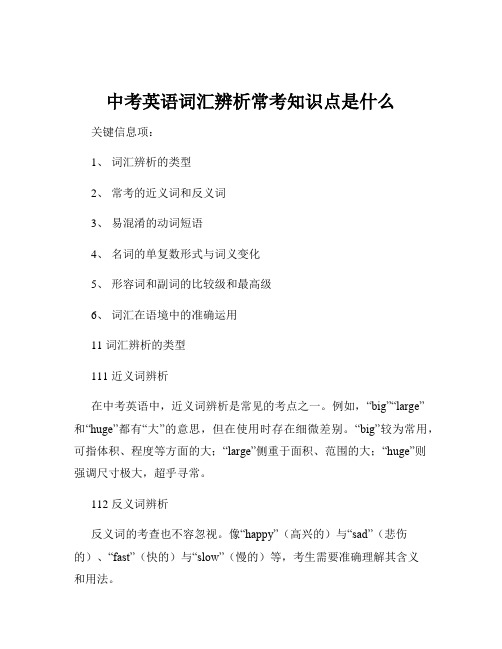
中考英语词汇辨析常考知识点是什么关键信息项:1、词汇辨析的类型2、常考的近义词和反义词3、易混淆的动词短语4、名词的单复数形式与词义变化5、形容词和副词的比较级和最高级6、词汇在语境中的准确运用11 词汇辨析的类型111 近义词辨析在中考英语中,近义词辨析是常见的考点之一。
例如,“big”“large”和“huge”都有“大”的意思,但在使用时存在细微差别。
“big”较为常用,可指体积、程度等方面的大;“large”侧重于面积、范围的大;“huge”则强调尺寸极大,超乎寻常。
112 反义词辨析反义词的考查也不容忽视。
像“happy”(高兴的)与“sad”(悲伤的)、“fast”(快的)与“slow”(慢的)等,考生需要准确理解其含义和用法。
113 形似词辨析一些词汇在拼写和发音上相似,但词义完全不同。
如“quite”(相当)和“quiet”(安静的),“accept”(接受)和“except”(除之外)。
12 常考的近义词和反义词121 常见的近义词“look”“see”“watch”都与“看”有关,但“look”强调看的动作,“see”侧重于看的结果,“watch”则常指观看活动、比赛等。
“spend”“cost”“take”“pay”都有“花费”之意,“spend”主语是人,“cost”主语是物,“take”通常用于“it takes sb some time to do sth”句型,“pay”常与“for”搭配。
122 常见的反义词“good”与“bad”、“right”与“wrong”、“many”与“few”、“much”与“little”等反义词在中考中经常出现,需要考生清晰掌握其用法和区别。
13 易混淆的动词短语131 由“put”构成的动词短语“put on”(穿上)、“put off”(推迟)、“put up”(张贴;举起)、“put away”(收拾好)等,这些短语的含义和用法各不相同。
(完整版)常用动词辨析
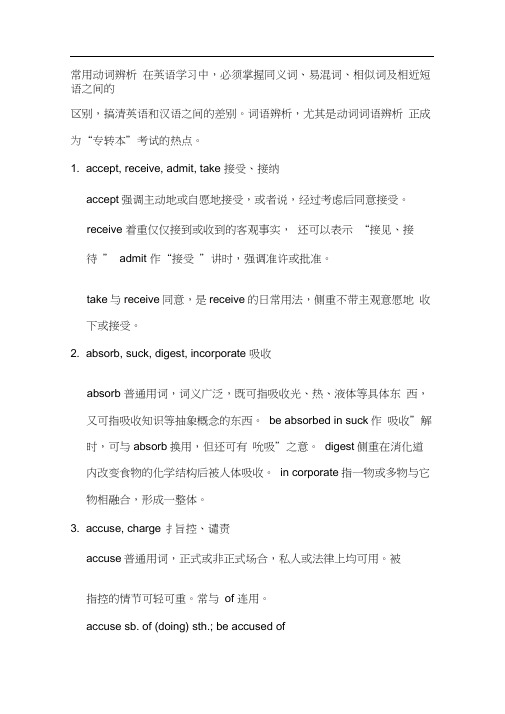
常用动词辨析在英语学习中,必须掌握同义词、易混词、相似词及相近短语之间的区别,搞清英语和汉语之间的差别。
词语辨析,尤其是动词词语辨析正成为“专转本”考试的热点。
1. accept, receive, admit, take 接受、接纳accept强调主动地或自愿地接受,或者说,经过考虑后同意接受。
receive 着重仅仅接到或收到的客观事实,还可以表示“接见、接待” admit 作“接受”讲时,强调准许或批准。
take与receive同意,是receive的日常用法,侧重不带主观意愿地收下或接受。
2. absorb, suck, digest, incorporate 吸收absorb 普通用词,词义广泛,既可指吸收光、热、液体等具体东西,又可指吸收知识等抽象概念的东西。
be absorbed in suck作吸收”解时,可与absorb换用,但还可有吮吸”之意。
digest侧重在消化道内改变食物的化学结构后被人体吸收。
in corporate指一物或多物与它物相融合,形成一整体。
3. accuse, charge扌旨控、谴责accuse普通用词,正式或非正式场合,私人或法律上均可用。
被指控的情节可轻可重。
常与of 连用。
accuse sb. of (doing) sth.; be accused ofcharge常与accuse换用,但charge多指较严重的错误或罪行,而且往往向法庭提出正式起诉。
charge sb. with (doing) sth.; be charged with4. acquire, obtain, gain, get, win, earn, secure 获得、取得、得到acquire 强调通过不断的、持续的努力而获得某物,也指日积月累地渐渐地获得。
书面语用词。
obtai n较正式用词,着重通过巨大努力、要求而得到所需或盼望已久的东西。
gain 侧重指经过努力或有意识行动而取得某种成就或获得某种利益或好处。
中考重点常见词汇和短语的辨析
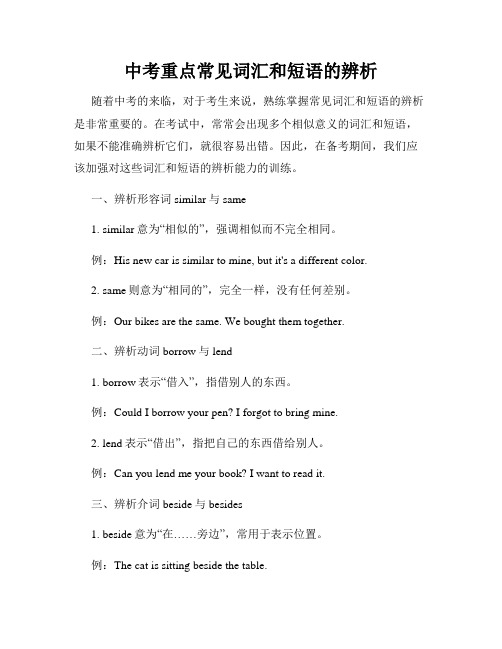
中考重点常见词汇和短语的辨析随着中考的来临,对于考生来说,熟练掌握常见词汇和短语的辨析是非常重要的。
在考试中,常常会出现多个相似意义的词汇和短语,如果不能准确辨析它们,就很容易出错。
因此,在备考期间,我们应该加强对这些词汇和短语的辨析能力的训练。
一、辨析形容词similar与same1. similar意为“相似的”,强调相似而不完全相同。
例:His new car is similar to mine, but it's a different color.2. same则意为“相同的”,完全一样,没有任何差别。
例:Our bikes are the same. We bought them together.二、辨析动词borrow与lend1. borrow表示“借入”,指借别人的东西。
例:Could I borrow your pen? I forgot to bring mine.2. lend表示“借出”,指把自己的东西借给别人。
例:Can you lend me your book? I want to read it.三、辨析介词beside与besides1. beside意为“在……旁边”,常用于表示位置。
例:The cat is sitting beside the table.2. besides意为“除了……之外”,常用于表示除了某事物或某人之外还有其他的事物或人。
例:Besides apples, we also have oranges.四、辨析动词learn与teach1. learn表示“学习”,指通过努力和训练获取新的知识或技能。
例:I learn English every day.2. teach表示“教”,指教授知识或技能给他人。
例:She teaches us math every Monday.五、辨析连词unless与if1. unless意为“除非”,相当于if not。
中考英语常见短语辨析
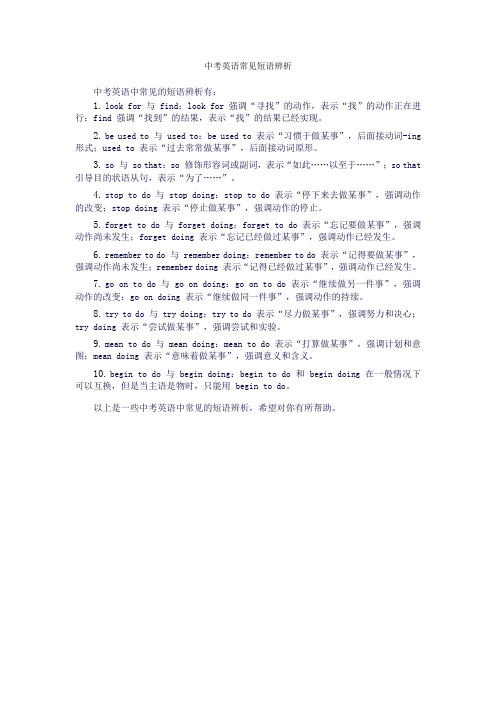
中考英语常见短语辨析中考英语中常见的短语辨析有:1.look for 与 find:look for 强调“寻找”的动作,表示“找”的动作正在进行;find 强调“找到”的结果,表示“找”的结果已经实现。
2.be used to 与 used to:be used to 表示“习惯于做某事”,后面接动词-ing 形式;used to 表示“过去常常做某事”,后面接动词原形。
3.so 与 so that:so 修饰形容词或副词,表示“如此……以至于……”;so that 引导目的状语从句,表示“为了……”。
4.stop to do 与 stop doing:stop to do 表示“停下来去做某事”,强调动作的改变;stop doing 表示“停止做某事”,强调动作的停止。
5.forget to do 与 forget doing:forget to do 表示“忘记要做某事”,强调动作尚未发生;forget doing 表示“忘记已经做过某事”,强调动作已经发生。
6.remember to do 与 remember doing:remember to do 表示“记得要做某事”,强调动作尚未发生;remember doing 表示“记得已经做过某事”,强调动作已经发生。
7.go on to do 与 go on doing:go on to do 表示“继续做另一件事”,强调动作的改变;go on doing 表示“继续做同一件事”,强调动作的持续。
8.try to do 与 try doing:try to do 表示“尽力做某事”,强调努力和决心;try doing 表示“尝试做某事”,强调尝试和实验。
9.mean to do 与 mean doing:mean to do 表示“打算做某事”,强调计划和意图;mean doing 表示“意味着做某事”,强调意义和含义。
10.begin to do 与 begin doing:begin to do 和 begin doing 在一般情况下可以互换,但是当主语是物时,只能用 begin to do。
2020年中考英语动词辨析大全(附答案)
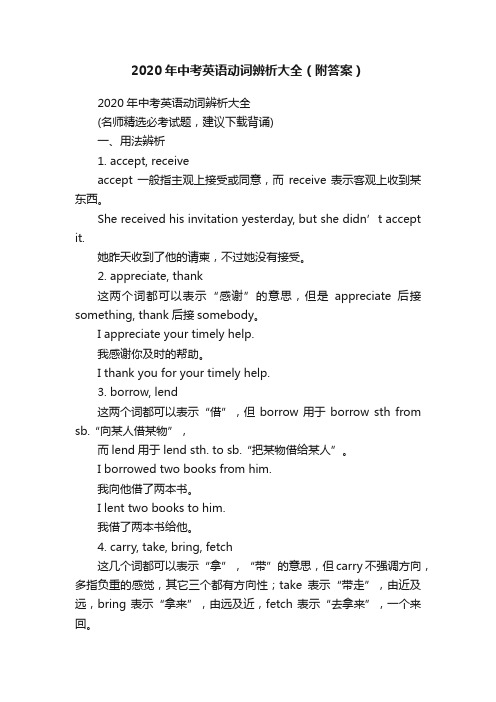
2020年中考英语动词辨析大全(附答案)2020年中考英语动词辨析大全(名师精选必考试题,建议下载背诵)一、用法辨析1. accept, receiveaccept一般指主观上接受或同意,而receive表示客观上收到某东西。
She received his invitation yesterday, but she didn’t accept it.她昨天收到了他的请柬,不过她没有接受。
2. appreciate, thank这两个词都可以表示“感谢”的意思,但是appreciate后接something, thank后接somebody。
I appreciate your timely help.我感谢你及时的帮助。
I thank you for your timely help.3. borrow, lend这两个词都可以表示“借”,但borrow用于borrow sth from sb.“向某人借某物”,而lend用于lend s th. to sb.“把某物借给某人”。
I borrowed two books from him.我向他借了两本书。
I lent two books to him.我借了两本书给他。
4. carry, take, bring, fetch这几个词都可以表示“拿”,“带”的意思,但carry不强调方向,多指负重的感觉,其它三个都有方向性;take表示“带走”,由近及远,bring表示“拿来”,由远及近,fetch表示“去拿来”,一个来回。
He is too young to carry the heavy box.他太小,拿不动这个沉重的箱子。
Don’t forget to take all your things away.不要忘了把你们所有的东西都带走。
Remember to bring your dictionary tomorrow.明天记住把你的词典带来。
中考英语复习 中考常考动词(近义词)辨析
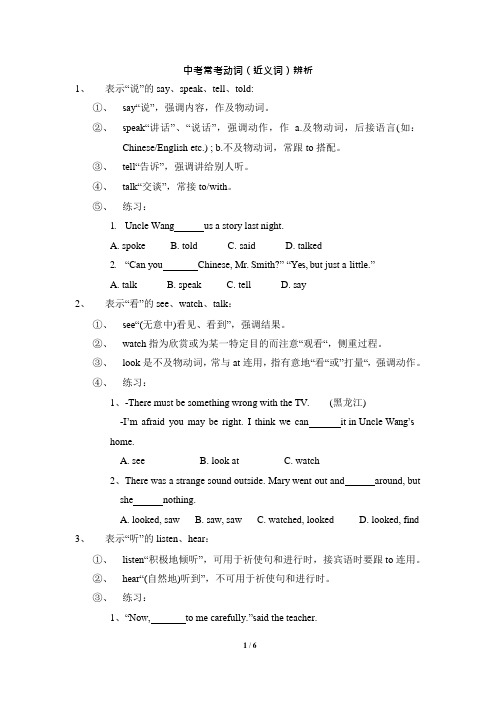
中考常考动词(近义词)辨析1、表示“说”的say、speak、tell、told:①、say“说”,强调内容,作及物动词。
②、speak“讲话”、“说话”,强调动作,作 a.及物动词,后接语言(如:Chinese/English etc.) ; b.不及物动词,常跟to 搭配。
③、tell“告诉”,强调讲给别人听。
④、talk“交谈”,常接to/with。
⑤、练习:1.Uncle Wang us a story last night.A. spokeB. toldC. saidD. talked2.“Can you Chinese, Mr. Smith?” “Yes, but just a little.”A. talkB. speakC. tellD. say2、表示“看”的see、watch、talk:①、see“(无意中)看见、看到”,强调结果。
②、watch 指为欣赏或为某一特定目的而注意“观看“,侧重过程。
③、look 是不及物动词,常与at 连用,指有意地“看“或”打量“,强调动作。
④、练习:1、-There must be something wrong with the TV. (黑龙江)-I’m afraid you may be right. I think we can it in Uncle Wang’shome.A. seeB. look atC. watch2、There was a strange sound outside. Mary went out and around, butshe nothing.A. looked, sawB. saw, sawC. watched, lookedD. looked, find3、表示“听”的listen、hear:①、listen“积极地倾听”,可用于祈使句和进行时,接宾语时要跟to 连用。
②、hear“(自然地)听到”,不可用于祈使句和进行时。
- 1、下载文档前请自行甄别文档内容的完整性,平台不提供额外的编辑、内容补充、找答案等附加服务。
- 2、"仅部分预览"的文档,不可在线预览部分如存在完整性等问题,可反馈申请退款(可完整预览的文档不适用该条件!)。
- 3、如文档侵犯您的权益,请联系客服反馈,我们会尽快为您处理(人工客服工作时间:9:00-18:30)。
初中常见动词短语及近义词词义辨析:
1. 常见的动词短语有以下几种形式:
动词+介词laugh at嘲笑point at指着worry about担忧
agree with赞成ask for请求talk about 谈论
pick up捡起grow up长大look out 当心stay up熬夜动词+名词make progress取得进步make faces做鬼脸
动词+名词+介词make friends with... 和……交朋友
动词+副词+介词stay away from远离get along with进展;处理
动词+介词+名词go to school go to bed
常见的动词短语
Take
take up占据;开始做….take away带走;拿走
take off起飞;脱掉
take down写下;记下;拆除take out拿出;切除
take place发生
take care of照顾
take part in 参加
make
make a decision作出决定make a mistake犯错
make a living谋生
make up组成;构成
Keep
keep out留在外面
keep up with并驾齐驱;跟上keep away from远离
keep in touch保持联系keep healthy保持健康
Give
give up放弃
give in 屈服;让步
give away捐赠
give out散发;分发
give off发出(光、热等)Get
get to 到达
get up 起床;起来
get over 克服
get on 上车
get off 下车
get together相聚
get ready for为……作准备Turn
turn on打开
turn off关闭
turn up开大;调高;出现turn down调低;关小
turn in上交
turn out结果是……
Put
put up搭建;张贴
put on穿上;上演
put off推迟;拖延
put out熄灭
put away把……收起来
put down写下;记下
put up with 容忍
Look
look at看
look for寻找
look after照顾;照料look up查阅
look through浏览look around环顾Come Go
go on继续
go back回到
go away走开;离开go by(时间)流逝go over仔细检查go off熄灭;离开
come over突然感到
come along出现;跟随
come out出现;出版;开花
come on加油;快点
come up with 想出
三个(be) used to
be used to doing sth.表示习惯做某事,此时to是介词,后跟动词ing形式。
used to do sth.表示过去常常做某事
be used to do sth.被用来做某事
2. 动词(近义词)的词义辨析:
三个“到达”get get to+地点名词
reach 及物动词,后面可跟地点名词
arrive in+大地点(名词)at+小地点(名词)
三个“借”borrow 非延续性动词,表示主语“借入”,常用搭配borrow sth.from sb.
lend非延续性动词,表示主语“借出”,常用搭配lend sth.to sb.
keep延续性动词,表示“长时间的借”。
三个“穿”dress dress sb.给某人穿衣服;dress sb.up打扮某人
put on 穿上,戴上,表示动作
wear穿着;戴着,表示状态
四个“看”see “看见”,表示结果
look “看”,表示动作,是不及物动词,后面需加介词at才能跟宾语
watch “观看(比赛、电视)
read “看(书、报纸)”,表示阅读
四个“拿”bring “带来,拿来”,表示“拿到靠近说话人的地方”
take “拿去,带走”,表示“拿到远离说话人的地方”
carry “扛,搬,用力移动”,没有方向
fetch “去取,去拿”,表示“往返拿东西”
四个“说”speak 作及物动词时后接表示语言的名词或指在会议上发言
say 常跟直接引语或间接引语,并且表示说的内容
talk 是不及物动词,长根介词to 和with,意为“同……谈话”,也表示具有说话的能力
tell 意为“告诉”,与story连用意为“讲故事”
四个“花费”spend 人作主语,表示花费时间或金钱,后接on sth.或(in) doing sth.
cost物作主语,意为“某物花费多少钱”
take可用于固定句型表示花费一段时间做某事,其结构为:
It +takes/ took+一段时间+to do sth.
pay 与介词for连用
两个“找”look for 强调寻找的过程
find 强调找到、发现的结果
两个“听”listen to listen为不及物动词,与to组成固定搭配,强调听的动作
hear 强调听到的结果
四个有关“输、赢”lose 意为“输给”某人,固定搭配为lose to sb.
fail 意为“失败”或“未做成某事”
beat 意为“打败”,后接sb.或某支队伍
win 意为“赢得”,如:赢得荣誉、地位、比赛等
三个“参加”join 一般指佳人苑“党派”或“组织”,如参军、入党等
take part in 指参加聚会或活动
attend 一般指出席会议,参加考试,入学等
四个“变化”turn 一般用于颜色的变化
get 天变黑、变长或变短
become 天气变暖或变冷等,表示渐变
grow 形状变大或变小。
